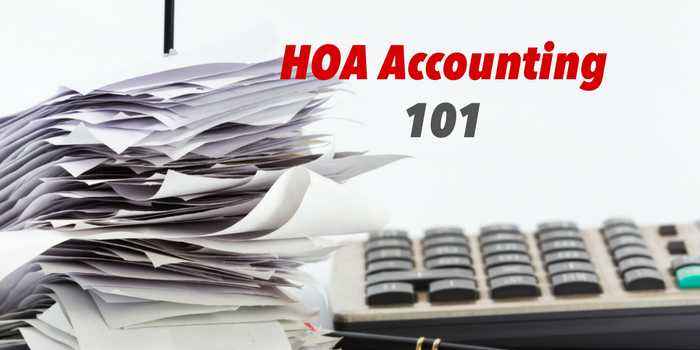One of the most important jobs of any HOA board is managing community finances. Unfortunately, this is also one of the most underestimated jobs. We’ve seen many boards mismanage the money simply because they didn’t understand basic accounting fundamentals. We know most financial trouble for HOA’s has nothing to do with intentional neglect, but everything to do bad or incomplete financial reporting.
After years of helping communities sort though financial troubles, we’ve learned the most important thing a board can do for financial health is to understand how to read and keep complete financial reports.
There are six things that go into keeping these reports:
- Income and expense ledger. This document is probably one of the most important financial statements to keep. It shows the actual amount of money spent each month compared to the assigned budget. It helps the community manager and board track incoming and outgoing money, and provides a snap shot of the financial health for the month and year.
- Balance sheet. This document shows the financial health of the community by comparing the association’s assets against its liabilities, which shows the association’s net worth.
- General ledger. This tool gives your board detailed information for every financial transaction.
- Cash distribution statement. Also known as a check register, this tracks all checks written by the association. It should include who the check was written to, check number and date, invoice date, budget code, and a description of the expense. This information allows you to track the accounts payable and an accounts delinquency report.
- Accounts delinquency statement. This report refers to accounts receivable and highlights members of the community who are not current with their dues.
- Accounts payable statement. This document tracks unpaid bills while showing the association’s expenditure and obligations for the month.
Managing the financial health of your community is important and it all starts with understanding the job. We encourage you to take the time to familiarize yourself with your financial reports, and then take the time to train the entire board on the basics of accounting fundamentals. Knowledge is power and it will help your board set the tone for good documentation!
While this list will give your board a good head start, consider working with a HOA property management company who can help establish good financial reporting, and who will teach you board members to read financial statements with a keen eye. Once you’ve established a good foundation, a property management company can help your board work on the more complicated part of community finances like taxes!








I could find nothing at your site about the need for open governance (full disclosure and transparency) and the associated concept of accountability that is or should be expected of HOA board of directors, officers, committees, and management associations, I expected to find at least some mention of the role of an annual financial report of the Board of Directors to the Association members and owners as a means to demonstrate the HOA’s accountability to the community. HOAs are to serve the owners, the stakeholders, and have a responsibility to assure through annual reporting including independent audits that the HOA is operating efficiently and effectively, providing reliable and useful information to the owners on a regularly basis (at least annually) and is complying with relevant laws, covenants, and regulations. Please address this important aspect of HOA leadership and management.
Hi James,
Maybe these three articles are what you are looking for. They can be found here, herehere, and here.
If this is not, we can gladly write an article in your direction!